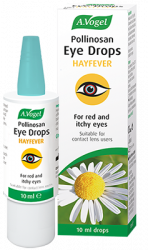An introduction to tight chests and hayfever
People afflicted by asthma may also be prone to hayfever. In fact asthma and hayfever are often grouped together and termed ‘atopy’ by doctors. This is because the individual has an increased tendency to develop allergies and typical symptoms of chest tightness and wheezing often occur in both conditions. Atopic individuals can also be prone to skin allergies or eczema.
Why is hayfever associated with asthma and wheezing?
People suffering from both asthma and hayfever experience symptoms because their immune systems are over-sensitive to substances normally encountered daily. This includes pollen which we typically associate with hayfever.
When your body overreacts to pollen, respiratory airways become inflamed and more mucus is produced to trap the pollen particles. This causes your airways to narrow, in turn making it more difficult for you to breathe.
For many hayfever sufferers this only affects the upper respiratory tract and symptoms are few and mild. However, in those who are prone to asthma, inflammation affects a larger part of the respiratory system. This leads to a greater and deeper degree of inflammation, worsening asthma symptoms.
This is when the sufferer experiences tightness in the chest. As they breathe, the air passes through these narrowed passages, and creates a whistling sound as it goes. This whistling sound is called wheezing.
Are there home remedies to help?
Finding a way to loosen the mucus in your airways allowing them to expand can help ease the feeling of tightness in the chest. Inhaling steam can be an effective means to do this, as the warm moist air can help loosen mucus. Adding salt to the water can also be beneficial.
Ginger has been found to be effective in reducing airway inflammation. It also acts as a muscle relaxant, helping to open your airways thus reducing chest tightness. Ginger can be consumed with your meal, in the form of tea, or eaten raw or crystallised.
As the tightness in your chest is likely to be the result of feeling congested, then reducing congestion is likely to bring effective relief. Breathing in peppermint or eucalyptus essence, or eating spicy foods, garlic and onions, may be effective in helping to ease congestion.
What about herbal remedies?
If your tight chest and wheezing are being caused by hayfever, then you may find a remedy for hayfever to be effective in easing these symptoms, as well as other hayfever symptoms you are experiencing.
For example, Pollinosan Hayfever Tablets combines several different herbs which work together to relieve hayfever symptoms. They can be found in the original formula devised by Alfred Vogel.
However, you may also find that easing congestion will ease your feeling of tightness in the chest, and thus a decongestant may be beneficial to you. Sinuforce Nasal Spray can be used alongside Polinosan Hayfever Tablets, and will clear and soothe nasal passages.
Which conventional medicines effective?
Most doctors or pharmacists would initially recommend anti-histamines to target your body’s over-reaction to pollen. These inhibit the release of the chemical histamine, so that your airways do not become inflamed or produce excess mucus, making it easier for you to breathe. However, some people develop tolerance to these medications or experience side effects.
In order to relieve congestion, there are various types of decongestants in tablet form or nasal sprays. However, many of these should only be used on a fairly short-term basis.
If it is suspected or confirmed that you are also asthmatic, you are likely to be prescribed an inhaler which can be used as both as a preventative measure and to relieve asthma symptoms. Your doctor will discuss treatment options available to you.




 Looking for relief of red and itchy eyes due to hayfever?
Looking for relief of red and itchy eyes due to hayfever?

